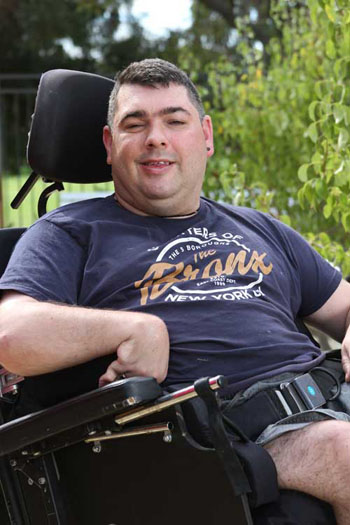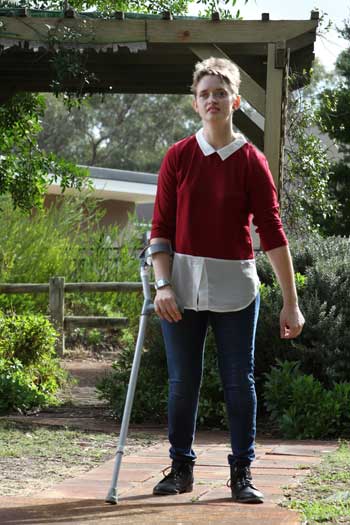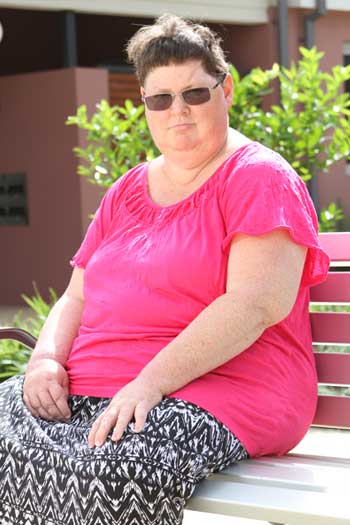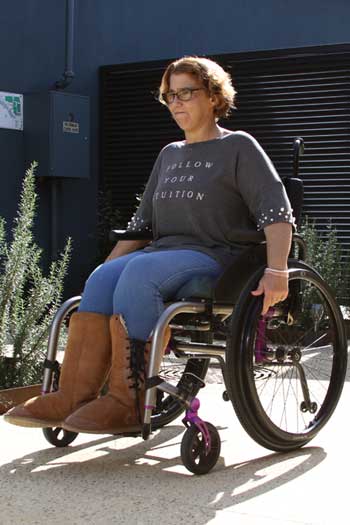Living With Your Disability
This section is for people with physical disabilities. Most information is for people with cerebral palsy or a similar physical disability.
The general topics in this section are useful for anyone with any physical disability. All sections are useful for families, carers, support staff and health professionals.
Start by reading these general topics, as they are useful for all people with a physical disability.
 Living with a physical disability is a lifelong journey, with highs and lows.
Living with a physical disability is a lifelong journey, with highs and lows.
Everybody feels the impacts of ageing as they get older. In the wider community, most people begin to feel the impact of ageing from their 60s. For those with physical disabilities, it is noted that:
- The life expectancy for people living with disabilities, regardless of severity, has increased to between 80% and 90% of the general population.
- Many people with disabilities experience some form of early ageing changes in their health and functioning, some as early as their 30s and 40s. This can be disappointing, particularly if they have invested time in maintaining their health in their younger years.
- There is a common thread to what people with disabilities experience as they get older – pain, fatigue and weakness are common, and can impact on activities and the ability to participate.
People with disabilities and health professionals together agree that it is important for people with disabilities to know the changes that are likely to happen with ageing, so that they can be monitored regularly to pick up changes early and prevent small problems becoming big ones.
These resources are useful for many people with physical disabilities and those who support them. They are also useful for people with a variety of abilities. While the focus in some of the resources is cerebral palsy and similar physical conditions, they are still useful for many people who have physical disabilities that start as a child or as a young adult. The experience is very similar.
On this website you will find information pages, links to services and downloadable fact sheets and templates.
There is a booklet on the common health and wellbeing needs of people with physical disabilities summarising the information on this website in printable form. It provides a snapshot of what you need to know and do to live well with your disability so that you can participate in whatever activities you are wanting to do.
There are also information pages for community support services and health professionals working with people with physical disabilities. Families, community support services and health professionals will all benefit from the resources for people with physical disabilities.
Being Prepared
Paying attention to your body and what you need to do can help you as you get older.
It is never too late to pay attention to what you need and take action. Things take time, thinking about things early means plenty of time to plan, think and do what you want to do.
For people with a physical disability, early planning can be particularly important because some treatment options – particularly surgical ones –are best addressed and actioned before the body stops growing. The human body changes rapidly during the teen years and some of these changes can cause injury, pain or problems later in life. Regular monitoring will help you pick up problems early.
In childhood, the same child health team may look after you for many years. They know you very well. Your parents have looked after all your decisions and you often do not know what has been discussed over your life.
In adulthood, you receive services from the adult health system. You may see many different specialists and teams in the adult health system, sometimes at different hospitals and community settings. If you have the ability to, you can become an expert in your own health and can make the decisions about what will happen.
Steps to managing life with a disability
- Around the age of 14, people with physical disabilities and their parents should begin discussions about long-term planning with their paediatrician, GP and therapy team.
- Long-term plans should be reviewed and updated every year in consultation with your network and team.
- A physiotherapy review should take place annually. Depending on your abilities and needs, other yearly reviews may be required with health professionals including occupational therapists, speech therapists, dietitians, social workers and psychologists.
The first step in being prepared is knowing and understanding your diagnosis and what it means for you. Remember though, your diagnosis is not your identity. Everyone is different with some things that are similar.
Important questions to ask:
- What is the diagnosis? What do the words mean?
- What is expected for someone with your diagnosis?
- What is possible?
- What is not possible?
- Are there changes likely to happen over the lifespan?
Ask your therapy team, GP or specialist to explain your diagnosis and what it means for you.
Cerebral Palsy Australia is a useful website with information about cerebral palsy including types, causes and classifications which has further links to other websites in their Learning Centre Links.
Online: http://cpaustralia.com.au
Cerebral palsy is a developmental disability. It results from damage to the brain. Impairments that are associated with cerebral palsy are non-progressive but permanent.
Words like “non-progressive” can be a bit confusing especially when you start to feel like you are losing some of the abilities you had before. The definition is talking about the brain injury. It is not talking about how your body works. Throughout your life, your body does change and some things do progress. Some things improve, some things get worse and others change during your life.
Remember that everyone with cerebral palsy or similar conditions is unique and your actual abilities will be different. There are though, common things that everyone experiences. Talk to your therapy team or general practitioner (GP) to understand more about your diagnosis.
 Knowing your normal and making sure those who support you also know your normal will assist you to explain any changes in your abilities to health professionals and other people supporting you. Ask yourself these questions, everyone's answers will be different, they are "your normal"
Knowing your normal and making sure those who support you also know your normal will assist you to explain any changes in your abilities to health professionals and other people supporting you. Ask yourself these questions, everyone's answers will be different, they are "your normal"
- How do you walk or transfer or move yourself up the bed or roll in bed?
- How much can you do by yourself? If you get help, do you get help because you want to or need to?
- What parts of your body can you move? There may be parts of your body that you have already had trouble moving and other areas that you have always been able to move.
- What parts of your body can you feel? There may be parts of your body that you have never been able to feel if they are moved or touched while other areas that you have always been able to feel if moved or touched. It may feel the same on both sides or feel different.
- Do you cough when you are eating or drinking? What foods and drinks are easy to swallow or more difficult?
- If you experience regular chest infections, know your resting heart rate and oxygen saturation when you are well. Your physiotherapist, nurse or doctor can help you find out these.
- If you have any additional medical conditions, know what your baseline is and have these reviewed regularly by your doctor e.g. diabetes, asthma.
The answers to these questions will be different for everyone. They are your normal. By knowing your normal, if changes occur, it will help the people who support you and the health professionals seeing you to plan how to support you.
Some changes and progressions are known. Exactly when they occur is different. Some changes are quick. For most, the changes happen slowly and are only noticed when they stop you doing something you really enjoy.
If changes are picked up early, the amount they progress can be reduced. Regular monitoring of your abilities and what your body can do helps pick up the changes and provide you with ideas of what you can do to slow the progression.
If your abilities change quickly or are a very large change in a short period of time, you need to take action as soon as possible. The changes can range from something that can be easily managed through to being a medical emergency. This can be very scary and difficult to explain to health professionals if you do not know ‘your normal’ and have regular monitoring.
Coping with change is hard for most people. Like many people with physical disabilities, you and your family have probably spent your years as a child trying to walk or transfer and to live as independently as possible. For some, you have tried very hard hoping that you won’t need to use equipment while others may have happily embraced equipment to help.
Whatever you have been doing, despite all your efforts you find that you are now struggling to do the things you want to. You may be tired and sore. Those who support you may have as much invested in your independence as you do and may struggle with the changes you are going through as well.
Being prepared for what may happen to your body can help you cope with the changes. Catching changes early can also help slow progression so that you can do the things that you want to. Understanding what your body is going through and looking at different ways to do things can also help you to cope with changes.
Independence means something different to different people. There is no right or wrong answer. For some, independence is being able to physically do everything by themselves and for others, independence is feeling in control or ‘in charge’ of things happening in their lives; others feel a sense of independence somewhere in between.
It is interesting to note that:
- People who do everything themselves, without support, often find it harder to cope with changes and experience more soreness and fatigue while people who accept help are less sore and tired and can generally cope better
- Wear and tear on the body generally appears to be less in those who accept help compared to those who don’t
- People who accept help often have more energy to get out and about doing the things they enjoy and seeing other people
Have a think about what independence means to you. Share this with those who support you.
 Living with your physical disability is a lifelong journey, with highs and lows. Everybody feels the impacts of ageing as they get older. While most people begin to feel the impacts of ageing in their 60s, people with a physical disability often begin to feel tired and sore earlier and may start to slow down much earlier in life, some as early as their 30s.
Living with your physical disability is a lifelong journey, with highs and lows. Everybody feels the impacts of ageing as they get older. While most people begin to feel the impacts of ageing in their 60s, people with a physical disability often begin to feel tired and sore earlier and may start to slow down much earlier in life, some as early as their 30s.
Many people living with a physical disability comment that they wish they had known what was going to happen and wanted more information to help them prepare.
Many comment with sentiments such as “I’m so tired, my tired is tired” or “I’ve hit a brick wall”.
Pain, fatigue, having to change or stop work or enjoyable activities are all very common as people get older. For those with physical disabilities, the experiences are greater and happen earlier in life. Regardless of why pain, fatigue, weakness and having to change how you do things happen, it is important to know that you can do something about it to stop small problems becoming big ones.
Conserving your energy is one of the most important things you will ever have to think about when living with a physical disability.
Conserving energy will be a journey. It will be a balancing act. At times you will get it right. At others, you won’t. Like others before you, it will test you. It will make you think about everything you have done before now and wonder if it was the right thing to do. It will make you fight for what you have set out to do. Health professionals will recommend things with your best interests at heart, that like most before you, you won’t like. It will eventually likely change your mind on firm opinions you have held for many years.
If you are a parent supporting your child with a physical disability, you will likely do the same.
This is all very normal. Everyone takes this journey at their own pace. Everyone copes with what health professionals recommend in different ways.
No one reaching the point of knowing how to conserve energy has ever said, “I did the wrong thing”. Rather, the sentiments are usually, “why didn’t I do this earlier?”, “if I stick to the plan and have balance, I can do more and I’m much happier,” or “there is nothing that could have changed my mind earlier, I just needed someone to tell me many, many times before I was ready”.
To find the best solution for you, discuss your energy with your physiotherapist and occupational therapist.
 Is equipment or support for you?
Is equipment or support for you?
While some people request equipment from their health professionals or people to support them at home, many view it as a setback in their independence. Common responses include “well that’s a slap in the face!”, “but I worked so hard to walk and transfer by myself”, or “I’m walking til the day I die – I’m not using a wheelchair” or “I can’t have someone else come into my home”.
Having equipment and support does not replace what you can do, they can work together. They are never the end of the line.
Sometimes the suggestion is because there is a need to make a big change so that you do not injury yourself or those who support you. Sometimes there are activities you can do to regain your previous skills.
For most people, equipment and support is suggested to help you conserve your energy. If you are still walking and completing transfers independently, there is a very good chance that you’ll continue to walk and transfer.
- Wheelchairs and scooters can mean you can move over longer distances and have the energy to walk around the home and shorter distances.
- Walkers can mean that you have the energy to walk more often.
- Hoists can mean you are at less risk of falling and have less stress on your body making you more comfortable. Using hoists also looks after the people who support you so that they are more available to help you do the activities that you want to do.
- Support from other people with household tasks can mean you have more energy to do other activities that are enjoyable. Many people spend hours doing household tasks that use up all their energy which leaves them unable to do anything else in their day.
For parents, it can be a similar feeling when equipment or support is suggested. Using equipment or getting support in the home can mean less strain on you as well as your child. It can mean more “parent” than “carer” time and give you more time to get out and about. This is important for everyone’s wellbeing and confidence in your child being supported into the future as you get older yourself.
Health professionals and community support coordinators often hear similar comments from people who have embraced equipment or support in the home and community: “thank you for helping me get a scooter or wheelchair, I can now go out for coffee with friends or take my kids to the park” and “thank you for helping me get someone to cook and clean, I’m finally getting out of the house”.
To wheel or not to wheel... it’s worth thinking about.
For more information, you may like to read these articles:
Gajdosik, C. G., & Cicirello, N. (2002). Secondary Conditions of the Musculoskeletal System in Adolescents and Adults with Cerebral Palsy. Physical & Occupational Therapy In Pediatrics, 21(4), 49–68. https://doi.org/10.1080/J006v21n04_04
Horsman, M., Suto, M., Dudgeon, B., & Harris, S. R. (2010). Ageing with cerebral palsy: psychosocial issues. Age and Ageing, 39(3), 294–299. https://doi.org/10.1093/ageing/afq018
Horsman, M., Suto, M., Dudgeon, B., & Harris, S. R. (2010). Growing Older With Cerebral Palsy. Pediatric Physical Therapy, 22(3), 296–303. https://doi.org/10.1097/PEP.0b013e3181eabc0f
Kemp, B. J. (2005). What the rehabilitation professional and the consumer need to know. Physical Medicine and Rehabilitation Clinics of North America, 16(1), 1–18, vii. https://doi.org/10.1016/j.pmr.2004.06.009
Morgan, P., Pogrebnoy, D., & McDonald, R. (2014). Health service experiences to address mobility decline in ambulant adults ageing with cerebral palsy. Journal of Intellectual & Developmental Disability, 39(3), 282–289. https://doi.org/10.3109/13668250.2014.927841
Pimm, P. (n.d.). PHYSIOLOGICAL BURN-OUT AND FUNCT1ONAL SKILL LOSS IN CEREBRAL PALSY. Retrieved March 23, 2018, from http://www.geocities.ws/pierremal/cp_pages/burnout.htm
